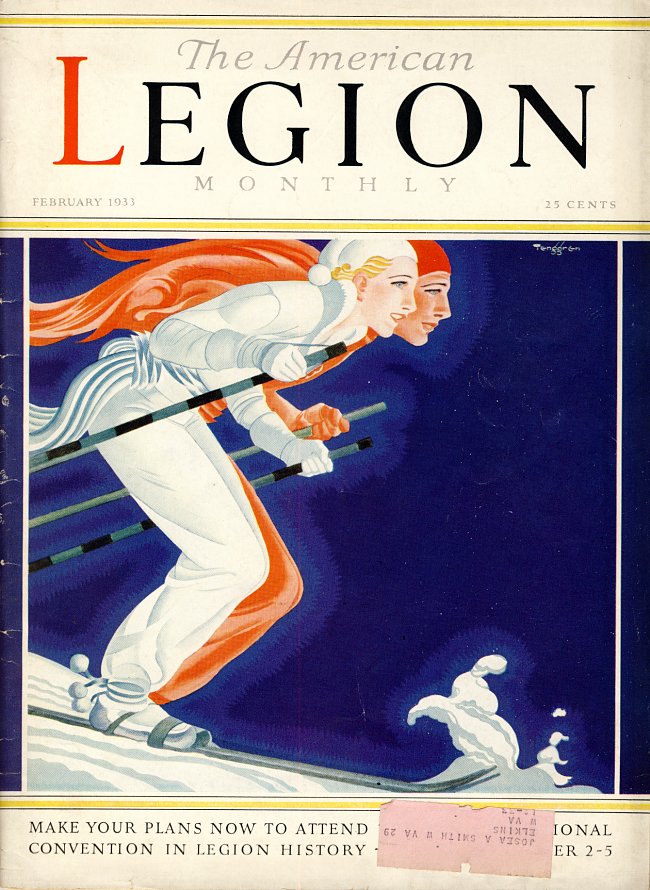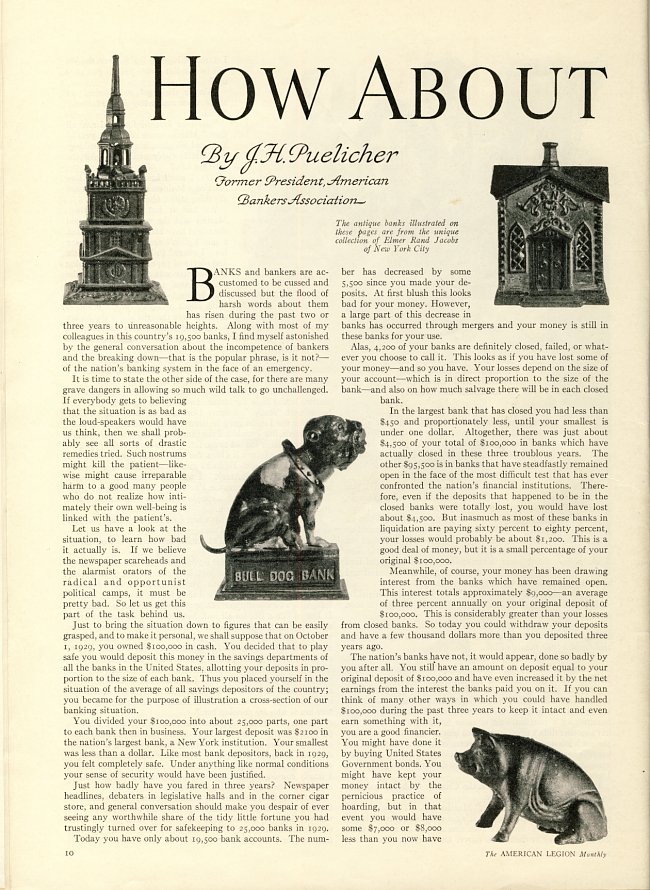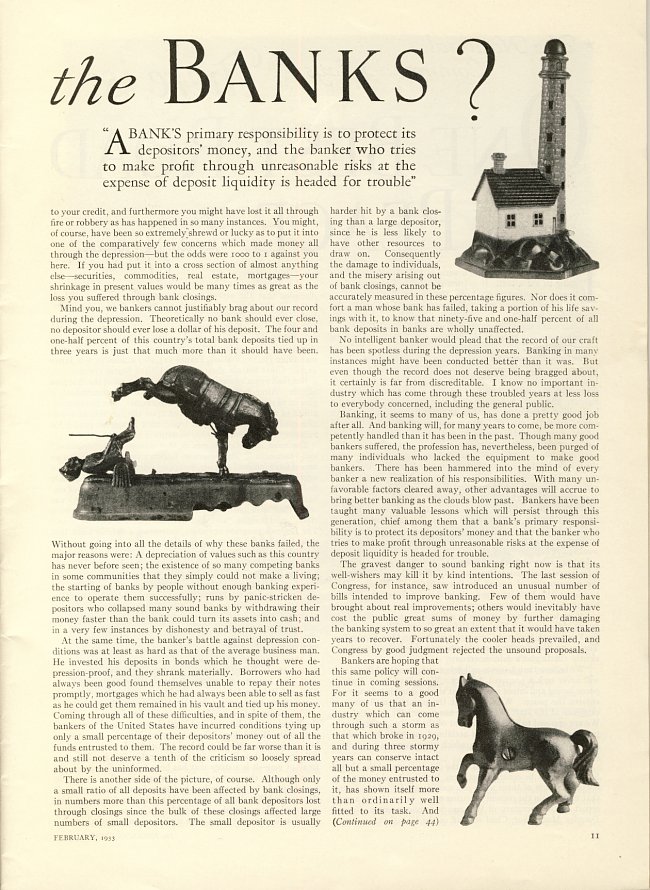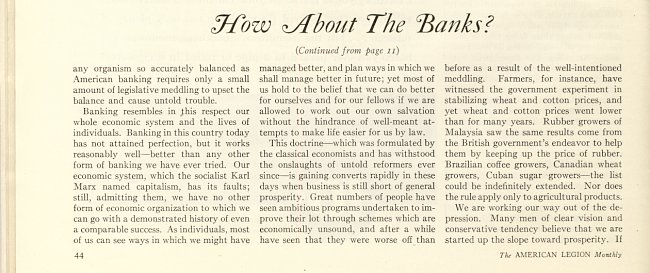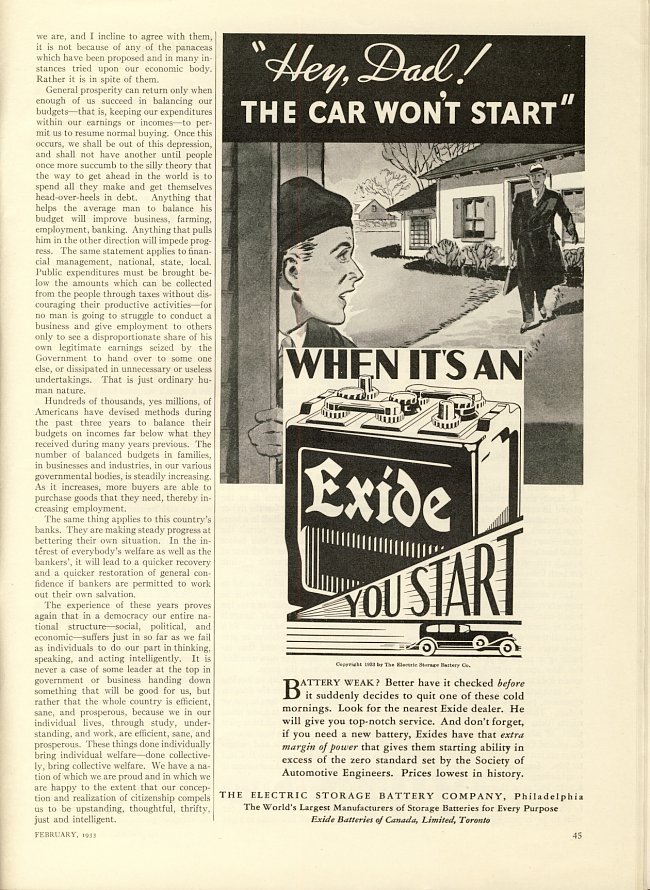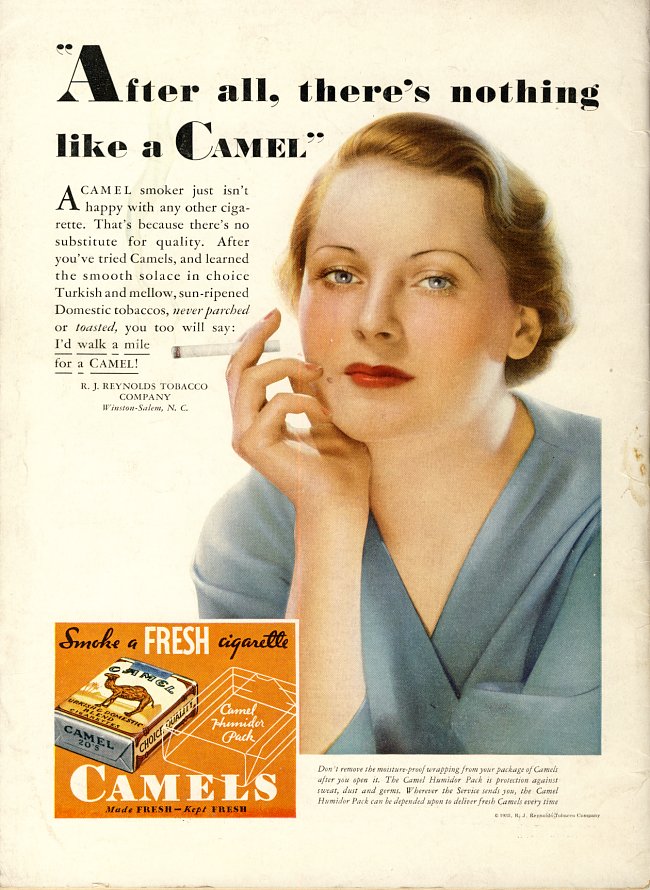|
HOW ABOUT the BANKS?
By J.H. Puelicher
Former President, American Bankers Association
"A BANK'S primary
responsibility is to protect its depositors' money, and the banker who
tries to make profit through unreasonable risks at the expense of
deposit liquidity is headed for trouble"
The antique banks
illustrated on these pages are from the unique collection of Elmer Rand
Jacobs of New York City
BANKS and bankers are
accustomed to be cussed and discussed but the flood of harsh words about
them has risen during the past two or three years to unreasonable
heights. Along with most of my colleagues in this country's 19,500
banks, I find myself astonished by the general conversation about the
incompetence of bankers and the breaking down—that is the popular
phrase, is it not?— of the nation's banking system in the face of an
emergency.
It is time to state
the other side of the case, for there are many grave dangers in allowing
so much wild talk to go unchallenged. If everybody gets to believing
that the situation is as bad as the loud-speakers would have us think,
then we shall probably see all sorts of drastic remedies tried. Such
nostrums might kill the patient—likewise might cause irreparable harm to
a good many people who do not realize how intimately their own
well-being is linked with the patient's.
Let us have a look at
the situation, to learn how bad it actually is. If we believe the
newspaper scareheads and the alarmist orators of the radical and
opportunist political camps, it must be pretty bad. So let us get this
part of the task behind us.
Just to bring the
situation down to figures that can be easily grasped, and to make it
personal, we shall suppose that on October I, 1929, you owned $100,000
in cash. You decided that to play safe you would deposit this money in
the savings departments of all the banks in the United States, allotting
your deposits in proportion to the size of each bank. Thus you placed
yourself in the situation of the average of all savings depositors of
the country; you became for the purpose of illustration a cross-section
of our banking situation.
You divided your
$100,000 into about 25,000 parts, one part to each bank then in
business. Your largest deposit was $2500 in the nation's largest bank, a
New York institution. Your smallest was less than a dollar. Like most
bank depositors, back in 1929, you felt completely safe. Under anything
like normal conditions your sense of security would have been justified.
Just how badly have
you fared in three years? Newspaper headlines, debaters in legislative
halls and in the corner cigar store, and general conversation should
make you despair of ever seeing any worthwhile share of the tidy little
fortune you had trustingly turned over for safekeeping to 25,000 banks
in 1929.
Today you have only
about 18,500 bank accounts. The number has decreased by some 5,500 since
you made your deposits. At first blush this looks bad for your money.
However, a large part of this decrease in banks has occurred through
mergers these banks for your use.
Alas, 4,200 of your
banks are definitely closed, failed, or whatever you choose to call it.
This looks as if you have lost some of your money—and so you have. Your
losses depend on the size of your account—which is in direct proportion
to the size of the bank—and also on how much salvage there will be in
each closed
bank.
In the largest bank
that has closed you had less than $450 and proportionately less, until
your smallest is under one dollar. Altogether, there was just about
$4,500 of your total of $100,000 in banks which have actually closed in
these three troublous years. The other $95,500 is in banks that have
steadfastly remained open in the face of the most difficult test that
has ever confronted the nation's financial institutions. Therefore, even
if the deposits that happened to be in the closed banks were totally
lost, you would have lost about $4,500. But inasmuch as most of these
banks in liquidation are paying sixty percent to eighty percent, your
losses would probably be about $1,200. This is a good deal of money, but
it is a small percentage of your original $100,000.
Meanwhile, of course,
your money has been drawing interest from the banks which have remained
open. This interest totals approximately $9,000—an average of three
percent annually on your original deposit of $100,000. This is
considerably greater than your losses from closed banks. So today you
could withdraw your deposits
and have a few thousand dollars more than you deposited three years ago.
The nation's banks
have not, it would appear, done so badly by you after all. You still
have an amount on deposit equal to your original deposit of $100,000 and
have even increased it by the net earnings from the interest the banks
paid you on it. If you can think of many other ways in which you could
have handled $100,000 during the past three years to keep it intact and
even earn something with it, you are a good financier. You might have
done it by buying United States Government bonds. You might have kept
your money intact by the pernicious practice of hoarding, but in that
event you would have some $7,000 or $8,000 less than you have to your
credit, and furthermore you might have lost it all through fire or
robbery as has happened in so many instances. You might, of course, have
been so extremely shrewd or lucky as to put it
into one of the comparatively few concerns which made money all through
the depression—but the odds were l000 to 1 against you here. If you had
put it into a cross section of almost anything else—securities,
commodities, real estate, mortgages—your shrinkage in present values
would be many times as great as the loss you suffered through bank
closings.
Mind you, we bankers
cannot justifiably brag about our record during the depression.
Theoretically no bank should ever close, no depositor should ever lose a
dollar of his deposit. The four and one-half percent of this country's
total bank deposits tied up in three years is just that much more than
it should have been. Without going into all the details of why these
banks failed, the major reasons were: A depreciation of values such as
this country has never before seen; the existence of so many competing
banks in some communities that they simply could not make a living; the
starting of banks by people without enough banking experience to operate
them successfully; runs by panic-stricken depositors who collapsed many
sound banks by withdrawing their money faster than the bank could turn
its assets into cash; and in a very few instances by dishonesty and
betrayal of trust.
At the same time, the
banker's battle against depression conditions was at least as hard as
that of the average business man. He invested his deposits in bonds
which he thought were depression-proof, and they shrank materially.
Borrowers who had always been good found themselves unable to repay
their notes promptly, mortgages which he had always been able to sell as
fast as he could get them remained in his vault and tied up his money.
Coming through all of these difficulties, and in spite of them, the
bankers of the United States have incurred conditions tying up only a
small percentage of their depositors' money out of all the funds
entrusted to them. The record could be far worse than it is and still
not deserve a tenth of the criticism so loosely spread about by the
uninformed.
There is another side
of the picture, of course. Although only a small ratio of all deposits
have been affected by bank closings, in numbers more than this
percentage of all bank depositors lost through closings since the bulk
of these closings affected large numbers of small depositors. The small
depositor is usually harder hit by a bank dosing than a large depositor,
since he is less likely to have other resources to draw on. Consequently
the damage to individuals, and the misery arising out of bank closings,
cannot be accurately measured in these percentage figures. Nor does it
comfort a man whose bank has failed, taking a portion of his life
savings with it, to know that ninety-five and one-half percent of all
bank deposits in banks are wholly unaffected.
No intelligent banker
would plead that the record of our craft has been spotless during the
depression years. Banking in many instances might have been conducted
better than it was. But even though the record does not deserve being
bragged about, it certainly is far from discreditable. I know no
important industry which has come through these troubled years at less
loss to everybody concerned, including the general public.
Banking, it seems to
many of us, has done a pretty good job after all. And banking will, for
many years to come, be more competently handled than it has been in the
past. Though many good bankers suffered, the profession has,
nevertheless, been purged of many individuals who lacked the equipment
to make good bankers. There has been hammered into the mind of every
banker a new realization of his responsibilities. With many unfavorable
factors cleared away, other advantages will accrue to bring better
banking as the clouds blow past. Bankers have been taught many valuable
lessons which will persist through this generation, chief among them
that a bank's primary responsibility is to protect its depositors' money
and that the banker who tries to make profit through unreasonable risks
at the expense of deposit liquidity is headed for trouble.
The gravest danger to
sound banking right now is that its well-wishers may kill it by kind
intentions. The last session of Congress, for instance, saw introduced
an unusual number of bills intended to improve banking. Few of them
would have brought about real improvements; others would inevitably have
cost the public great sums of money by further damaging the banking
system to so great an extent that it would have taken years to recover.
Fortunately the cooler heads prevailed, and Congress by good judgment
rejected the unsound proposals.
Bankers are hoping
that this same policy will continue in coming sessions. For it seems to
a good many of us that an industry which can come through such a storm
as that which broke in 1929, and during three stormy years can conserve
intact all but a small percentage of the money entrusted to it, has
shown itself more than ordinarily well fitted to its task. And any
organism so accurately balanced as American banking requires only a
small amount of legislative meddling to upset the balance and cause
untold trouble.
Banking resembles in
this respect our whole economic system and the lives of individuals.
Banking in this country today has not attained perfection, but it works
reasonably well—better than any other form of banking we have ever
tried. Our economic system, which the socialist Karl Marx named
capitalism, has its faults; still, admitting them, we have no other form
of economic organization to which we can go with a demonstrated history
of even a comparable success. As individuals, most of us can see ways in
which we might have managed better, and plan ways in which we shall
manage better in future; yet most of us hold to the belief that we can
do better for ourselves and for our fellows if we are allowed to work
out our own salvation without the hindrance of well-meant attempts to
make life easier for us by law.
This doctrine—which
was formulated by the classical economists and has withstood the
onslaughts of untold reformers ever since—is gaining converts rapidly in
these days when business is still short of general prosperity. Great
numbers of people have seen ambitious programs undertaken to improve
their lot through schemes which are economically unsound, and after a
while have seen that they were worse off than before as a result of the
well-intentioned meddling. Farmers, for instance, have witnessed the
government experiment in stabilizing wheat and cotton prices, and yet
wheat and cotton prices went lower than for many years. Rubber growers
of Malaysia saw the same results come from the British government's
endeavor to help them by keeping up the price of rubber. Brazilian
coffee growers, Canadian wheat growers, Cuban sugar growers—the list
could be indefinitely extended. Nor does the rule apply only to
agricultural products.
We are working our,
way out of the depression. Many men of dear vision and conservative
tendency believe that we are started up the slope toward prosperity.
If we are, and I incline to agree with them, it is not because of any of
the panaceas which have been proposed and in many instances tried upon
our economic body. Rather it is in spite of them.
General prosperity
can return only when enough of us succeed in balancing our budgets—that
is, keeping our expenditures within our earnings or incomes—to permit us
to resume normal buying. Once this occurs, we shall be out of this
depression, and shall not have another until people once more succumb to
the silly theory that the way to get ahead in the world is to spend all
they make and get themselves head-over-heels in debt. Anything that
helps the average man to balance his budget will improve business,
farming, employment, banking. Anything that pulls him in the other
direction will impede progress. The same statement applies to financial
management, national, state, local. Public expenditures must be brought
below the amounts which can be collected from the people through taxes
without discouraging their productive activities—for no man is going to
struggle to conduct a business and give employment to others only to see
a disproportionate share of his own legitimate earnings seized by the
Government to hand over to some one else, or dissipated in unnecessary
or useless undertakings. That is just ordinary human nature.
Hundreds of
thousands, yes millions, of Americans have devised methods during the
past three years to balance their budgets on incomes far below what they
received during many years previous. The number of balanced budgets in
families, in businesses and industries, in our various governmental
bodies, is steadily increasing. As it increases, more buyers are able to
purchase goods that they need, thereby increasing employment.
The same thing
applies to this country's banks. They are making steady progress at
bettering their own situation. In the interest of everybody's welfare as
well as the bankers', it will lead to a quicker recovery and a quicker
restoration of general confidence if bankers are permitted to work out
their own salvation.
The experience of
these years proves again that in a democracy our entire national
structure—social, political, and economic—suffers just in so far as we
fail as individuals to do our part in thinking, speaking, and acting
intelligently. It is never a case of some leader at the top in
government or business handing down something that will be good for us,
but rather that the whole country is efficient, sane, and prosperous,
because we in our individual lives, through study, understanding, and
work, are efficient, sane, and prosperous. These things done
individually bring individual welfare—done collectively, bring
collective welfare. We have a nation of which we are proud and in which
we are happy to the extent that our conception and realization of
citizenship compels us to be upstanding, thoughtful, thrifty, just and
intelligent.
FEBRUARY, 1933
|
